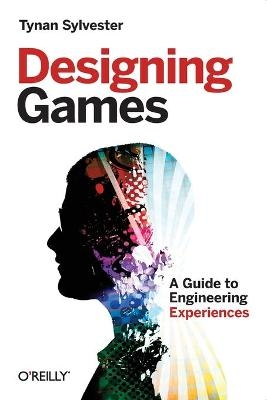
Designing Games
O'Reilly Media, Inc, USA (Verlag)
978-1-4493-3793-3 (ISBN)
Ready to give your design skills a real boost? This eye-opening book helps you explore the design structure behind most of today’s hit video games. You’ll learn principles and practices for crafting games that generate emotionally charged experiences—a combination of elegant game mechanics, compelling fiction, and pace that fully immerses players.
In clear and approachable prose, design pro Tynan Sylvester also looks at the day-to-day process necessary to keep your project on track, including how to work with a team, and how to avoid creative dead ends. Packed with examples, this book will change your perception of game design.
- Create game mechanics to trigger a range of emotions and provide a variety of play
- Explore several options for combining narrative with interactivity
- Build interactions that let multiplayer gamers get into each other’s heads
- Motivate players through rewards that align with the rest of the game
- Establish a metaphor vocabulary to help players learn which design aspects are game mechanics
- Plan, test, and analyze your design through iteration rather than deciding everything up front
- Learn how your game’s market positioning will affect your design
Tynan Sylvester first designed games in 2000. His smallest projects were one-man independent games on which he wrote every line of code and painted every frame of art. His largest was four years on Irrational Games' 110-person development team making BioShock Infinite. He has also written several feature design articles for Gamasutra, the biggest game design website. Tynan believes that much of what we think of game design grows from the metaphors we use to describe it. He likes to work at finding metaphors that create useful answers instead of deadly assumptions. He also enjoys bacon and prefers Picard to Kirk.
Engines of Experience
Chapter 1 Engines of Experience
Mechanics and Events
The Primacy of Emotion
Emotional Triggers
Emotion and Change
The Basic Emotional Triggers
The Fiction Layer
Constructing Experiences
Engines of Experience
Game Crafting
Chapter 2 Elegance
Elegance from Emergence
I Love the Smell of Elegance in the Morning
Elegance Case Study: Predator versus Hellion
Chapter 3 Skill
Depth
Accessibility
Skill Range
Stretching Skill Range
Handling Failure
Chapter 4 Narrative
Narrative Tools
Scripted Story
World Narrative
Emergent Story
Story Ordering
Agency Problems
Case Study: Fallout 3
Chapter 5 Decisions
Feeling the Future
Information Balance
Problematic Information Sources
Decisions and Flow
Decisions Case Study: Counter-Strike
Chapter 6 Balance
Goals of Balance
Degenerate Strategies
Balance and Skill
Balance Challenges and Solutions
Chapter 7 Multiplayer
Game Theory
Yomi
Destructive Player Behavior
Chapter 8 Motivation and Fulfillment
Dopamine Pleasure
Dopamine Motivation
Rewards Anticipation
Reinforcement Schedules
Extrinsic and Intrinsic Motivation
Player’s Remorse
Chapter 9 Interface
Metaphor
Signal and Noise
Redundancy
Indirect Control
Input
Chapter 10 The Market
Design Purpose
The Tournament Market
Market Segments
Nobody Knows Anything!
Confirmation Bias
Process
Chapter 11 Planning and Iteration
The Overplanner
The Underplanner
Underplanning and Overplanning
Iteration
Planning Horizon
Why We Overplan
Test Protocol
Grayboxing
The Paradox of Quality
The Fallacy of Vision
Serendipity
Believing in Iteration
Chapter 12 Knowledge Creation
Knowledge Creation Methods
The Organic Process
Chapter 13 Dependencies
The Dependency Stack
Chapter 14 Authority
The Banality of Evil
Taylorism
Chapter 15 Motivation
Extrinsic Rewards
Climate
Social Motivation
The Progress Principle
Chapter 16 Complex Decisions
Decision Effects
Decision Effects Case Study
Chapter 17 Values
Openness
Candor
Humility
Hunger
Appendix Endgame
Appendix Recommended Books
Appendix Quiz Answers
Appendix Sources
Chapter 1: Engines of Experience
Chapter 5: Decisions
Chapter 6: Balance
Chapter 7: Multiplayer
Chapter 8: Motivation and Fulfillment
Chapter 9: Interface
Chapter 10: The Market
Chapter 11: Planning and Iteration
Chapter 12: Knowledge Creation
Chapter 14: Authority
Chapter 17: Values
| Erscheint lt. Verlag | 1.11.2013 |
|---|---|
| Zusatzinfo | illustrations |
| Verlagsort | Sebastopol |
| Sprache | englisch |
| Maße | 152 x 229 mm |
| Gewicht | 558 g |
| Einbandart | Paperback |
| Themenwelt | Informatik ► Software Entwicklung ► Spieleprogrammierung |
| ISBN-10 | 1-4493-3793-7 / 1449337937 |
| ISBN-13 | 978-1-4493-3793-3 / 9781449337933 |
| Zustand | Neuware |
| Haben Sie eine Frage zum Produkt? |
aus dem Bereich


